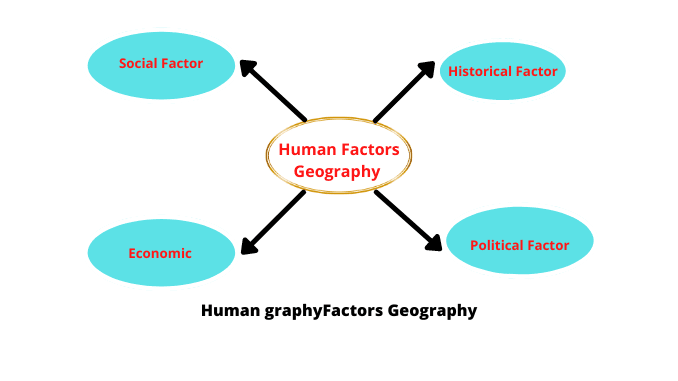
Introduction
All factors that affect human lifestyle, behavior, cultural activity, economic activity, etc. are known as human factors in human geography. Human geography is a branch of sociology that discusses the earth, the habitats of the people living on the earth, and their culture. Below is a discussion of what is human factors geography.
One of the branches of geography is human geography which deals with the morphological methods and processes of society. This branch of geography discusses how people adapt to their environment and use their own environment.
Human factors in geography shed light on various man-made issues. It mainly reviews people and their political, cultural, social, and economic aspects. All these factors are described below (1) & (4).
What is human factors geography?
Man is the main geographical controller on the earth. Because people live in the environment. Humans expand and change the landscape for their own needs. One of the topics of discussion in this geography is humans. There are some factors that play an important role in human geography. The human factors are-
1. Economic factor
- An important aspect of human geography is the study of economics and resources.
- The study of the impact of land on human economic activities or the way in which human economic activities are influenced by land is the subject of human geography.
- Annual production, extraction, world distribution, and world trade of economic fields like agricultural products, mineral resources, fisheries resources, etc. are the economic factors of human geography.
- The other economic factors are income, quality, availability of employment, poverty rate, GDP, quality and availability of education, etc.
- Economic factors consider different aspects of the economy and how perspectives in each field can affect the economic conditions (2) & (4).
2. Social factor
- Social factors are a part of human geography that is closely related to social theory in general and sociology in particular.
- These factors affect someone’s lifestyle. Social factors may include wealth, religion, family size, and structure, education level, population density, etc.
- The study of the effects of land and climate on the social differences of human beings living on the surface is included in the subject matter of human geography.
- Society refers to a group of people living together in mutual relations and in the functioning of different customs and institutions.
- All these social factors are very important enough in the case of society and the people living in the society.
- These factors are related to the cultural and demographic tendencies of society.
- They also affect the population growth rates, health consciousness, age distribution, etc. (3) & (4).
3. Historical factors
- It is also an important factor in human geography.
- There are 4 important historical factors that view history. These are society, space, individuals, and time.
- The historical factor is the factor of human geography that provides evidence to the facts of history.
- Historical factors are based on humans and the events of the past time.
- These factors describe the study of a place or region at a specific time or period in the past. That is, these factors discuss how a region’s geography has changed and its impact on the human environment (4).
4. Political factors
- Political factors are a part of human geography.
- It describes human governments, the boundaries and subdivisions of political characteristics, and the situations of various states, cities, as well as the world.
- They are very closely attached to human geography.
- These factors are how government policies and measures can affect the economy and specific industries.
- There are 5 political factors. These are tariffs, trade restrictions, environmental law, tax policy, and labor law (4).
What are the cultural factors?
Cultural factors consist of the values and ideologies of a particular community. Human culture is the description and interpretation of spatial types and surrounding relationships. Cultural factors are a combination of four compound thoughts. People are the central character in the discussion of culture (4).
All the topics of human culture such as anthropology, ethnography, linguistics, archeology, fossils, etc. belong to the subject of human geography. There are various types of cultural factors.
- Language
- Religion
- Clothing
- Food habits
- Architecture
- Customs
- Social collectives
- Gender
- Agriculture etc. are the factors of human culture.
Characteristic
1. Culture is not innate and acquired through education.
2. The subject of culture is social, not personal. It originates and develops in terms of social relations.
3. Culture is a dynamic and changing subject according to utility.
4. It provides ample opportunity to meet all our biological and social needs.
5. Every society has its own unique culture. But that culture is different in different societies.
6. Culture is primarily an emotional or introverted subject.
7. It gives birth to a tradition if it lasts a long time. This tradition is the cultural heritage of any society (1).
Cultural factors
Cultural factors are used to meet human needs. Objects that do not meet human needs are not considered elements of culture. In order to meet many different needs, socialized people resort to different ways. The different factors of culture can be basically divided into two parts.
1. Perceptual element
The Perceptual element is when human culture is expressed in real form. Man’s mental ideas and values are described through these practical elements. These elements are called non-symbolic elements. In this case, for example, monasteries, temples, schools, colleges, etc. can be mentioned.
2. Human element
Some of the factors included in human culture indicate the ideal beliefs of the individuals in society. All these factors of culture are called human elements. For example, music, literature, drama, etc. can be mentioned as human elements. Human culture is a combination of different perceptual elements and human elements. But all these elements are interrelated (1).
Q&A
1. What cultural factors do geographers consider when they study human geography?
- Language
- Religion
- Ethnicity
- Customs
2. Which are cultural factors that geographers focus on in their study of human geography?
The language, religion, food habits, architecture, customs, ethnicity, and traditions are all cultural factors that geographers focus on in their study.
3. Geographers consider these cultural factors when they study human geography.
Customs, religions, language, and ethnicity are the four cultural factors when geographers study.
4. What are human factors in geography?
- Economic factors
- Social factor
- Historic factors &
- Political factors
5. Geographers consider which factors in their study of human geography?
Geographers consider these types of factors in their study
- Cultural factors
- Political factors
- Historical factors
- Economic factors
- Social factors
- Population factors
- Health factors
- Rural factors etc.
